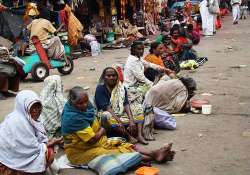Every 4th beggar in India is a Muslim: Census 2011
Around 25 per cent of the beggars in India belong to the Muslim community, according to Census data released last month.

Around 25 per cent of the beggars in India belong to the Muslim community, according to Census data released last month.
According to a report in The Indian Express, this data has taken into account the religious orientation of those deemed ‘non workers’ in Census 2011.
The Census defines ‘Non workers’ as individuals who do not participate in any paid or unpaid economic activity including household duties and cultivation.
According to 2011 Census data, India has a total of 72.89 crore non workers out of which 3.7 lakh are beggars.
The number of beggars has actually gone down compared to 2001 Census data which recorded the number of beggars at 6.3 lakh.
Out of 3.7 lakh people categorised as ‘beggars’ in 2011 Census data, 92,760 people belong to the Muslim community accounting for nearly 25 per cent of the total population of beggars in India.
Interestingly, the percentage of female beggars among Muslims is higher compared to males. The national average is 53.13 per cent male beggars to 46.87 per cent female beggars. Among Muslims, however, the ratio is 56.38 per cent female beggars against is 43.61 per cent male beggars.
Since Hindus constitute the largest chunk of India’s population, their share in beggar’s population is also the maximum. With 2.68 lakh individuals, Hindus make up 72.22 per cent of its beggar population.
Christians, who are 2.3 per cent of the population, make up 0.88 per cent of the beggar population with 3,303 individuals.
Similarly, Buddhists constitute 0.52 per cent, Sikhs 0.45 per cent and Jains 0.06 per cent of the entire beggar population.
As far as the law of the land is concerned, beggary is illegal in India. It is also punishable by imprisonment of 3-10 years.
However, the categorisation of beggars in India has always been questioned by social activists.
Under the Bombay Prevention of Begging Act, 1959, anyone having no visible means of subsistence and found wandering about in a public space is considered a beggar.
The list also includes those who seek alms at public placers under any pretence including singing, dancing, fortune-telling or street performing.